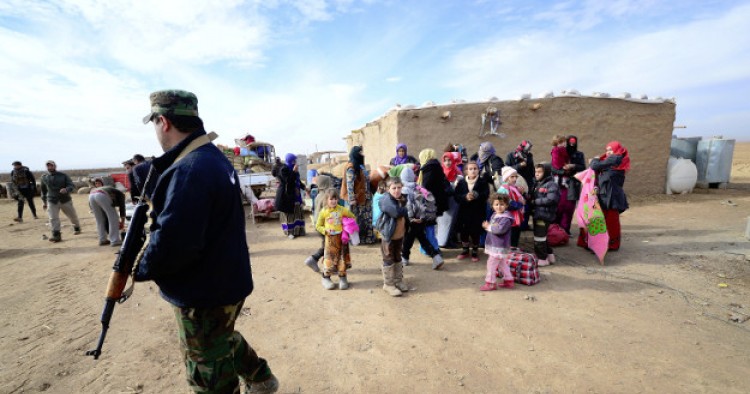The Iraqi Popular Mobilization Forces today seized nine villages around al-Qairawan region in western Mosul from the Islamic State, the Iranian media reports. According to a P.M.F. statement, the paramilitary forces “managed to reach the Sinjar mountains and block the road that connects Sinjar to al-Ba’aj. Tasnim News Agency, an outlet affiliated with the Islamic Revolution Guards Corps (I.R.G.C.), reports that Islamic State fighters have declared an emergency in the center of al-Ba’aj and are preparing to fight back. The P.M.F. statement also noted that the paramilitary forces have launched a separate operation near the Syrian border.
Comment: The prominent role of Iran-backed units within the P.M.F. in military operations in western Mosul has alarmed Iraqi Sunnis as well as regional Sunni states, particularly Turkey. A commander of Kurdish peshmerga forces in the Iraqi town of Sinjar, Sarbast Lazkeen, cautioned earlier this month that any further expansion of Iran-backed forces toward the Syrian border and into Kurdish regions could prompt a direct military intervention by Turkey, Saudi Arabia or the United States. He said Iran-supported groups within the P.M.F. are currently about 40 miles away from the Syria border. Kurdish President Masoud Barazni also reportedly ordered the peshmerga forces to stop P.M.F. units from entering into Kurdish cities and has called for an urgent meeting with military leaders in Sinjar.
But despite growing concerns, the P.M.F. forces are continuing military operations with the aim of securing strategic regions that connect western Mosul to the Syrian border. It is part of Tehran's broader plan to secure a land route connecting Damascus to Baghdad.
The Sinjar region may prove to be a flashpoint for proxy conflicts once the Islamic State is defeated in Mosul and surrounding areas – particularly between factions supported by Iran and Turkey. Rival Kurdish groups – Iraqi Kurdistan Democratic Party (K.D.P.) and Kurdistan Workers’ Party (P.K.K.) – are already engaged in a deadly conflict in Sinjar. The P.K.K. has conducted attacks inside Turkey for a long time, and Ankara has made it clear that it will not tolerate the presence of P.K.K. close to its border and will intervene militarily if needed. Such a move will most likely place Turkey and its Iraqi allies in a direct confrontation with Iran-supported militia groups that have considerable influence in western Mosul. The inter-Kurdish clashes in Sinjar may also sour relations between Iran and the Kurdish Regional Government (K.R.G.), which intends to bring Sinjar under its own authority.
The P.M.F. consists of militia forces largely from Shiite but also other Iraqi ethnic and religious groups. While some P.M.F. units are Iraqi nationalists and follow Iraq’s top cleric Grand Ayatollah Ali Sistani, many prominent groups within P.M.F. have close ties with Qassem Soleimani, the head of the I.R.G.C.’s elite Quds Force. What makes Sunnis particularly worried is that, despite P.M.F.’s diversity, it is the Iran-backed militia units within the P.M.F. – such as Asaib Ahl al-Haq, Kata’ib Hezbollah and the Badr Organization – that are playing the most prominent role in western Mosul. These groups have also launched a vicious propaganda campaign against U.S. troops advising Iraqi forces in Mosul and across Iraq.
The Middle East Institute (MEI) is an independent, non-partisan, non-for-profit, educational organization. It does not engage in advocacy and its scholars’ opinions are their own. MEI welcomes financial donations, but retains sole editorial control over its work and its publications reflect only the authors’ views. For a listing of MEI donors, please click here.












